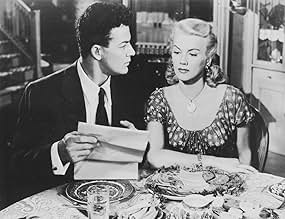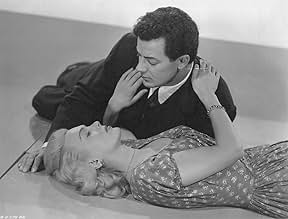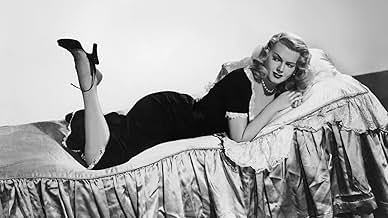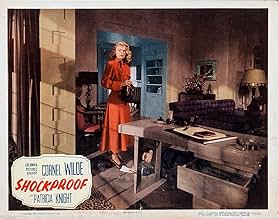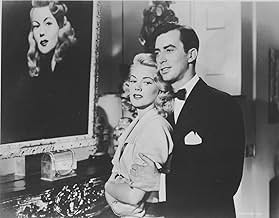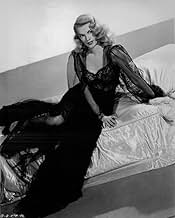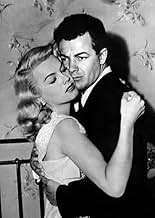CALIFICACIÓN DE IMDb
6.5/10
2.7 k
TU CALIFICACIÓN
Jenny Marsh es una ex presidiaria que, tras pasar cinco años en la cárcel y conseguir la libertad condicional, establece una estrecha relación con el agente que debe vigilarla.Jenny Marsh es una ex presidiaria que, tras pasar cinco años en la cárcel y conseguir la libertad condicional, establece una estrecha relación con el agente que debe vigilarla.Jenny Marsh es una ex presidiaria que, tras pasar cinco años en la cárcel y conseguir la libertad condicional, establece una estrecha relación con el agente que debe vigilarla.
- Dirección
- Guionistas
- Elenco
Shirley Adams
- Emmy
- (sin créditos)
Gilbert Barnett
- Barry
- (sin créditos)
Richard Benedict
- 'Kid' - Knife Wielder
- (sin créditos)
Paul Bradley
- Airline Clerk
- (sin créditos)
Argentina Brunetti
- Stella
- (sin créditos)
Paul Bryar
- Man in Car
- (sin créditos)
John Butler
- Sam Green, Pawnbroker
- (sin créditos)
Claire Carleton
- Florrie Kobiski
- (sin créditos)
Cliff Clark
- Mac - Police Lieutenant
- (sin créditos)
King Donovan
- Joe Wilson
- (sin créditos)
Al Eben
- Joe Kobiski
- (sin créditos)
- Dirección
- Guionistas
- Todo el elenco y el equipo
- Producción, taquilla y más en IMDbPro
Opiniones destacadas
Shockproof (1949)
Sam Fuller, the writer of this film, is admired for breaking rules and being a little bit edgy. Douglas Sirk, the director, is known for sumptuous, no compromise melodramas with gorgeous dreamy sets and an arch and affecting artificiality. They make an odd mix, and something doesn't quite click here.
The plot is standard fare but good--a parole officer falls for a reluctant parole, who still has a thing for a thug up to no good. The officer is terrific, Cornell Wilde at his regular guy best, a kind of echo of Dana Andrews with a little more warmth. But the main woman, Patricia Wright, is a bit wooden. You can feel her trying too hard too often, and it's just one of those things that cuts the rest of the effort down to size. Not surprisingly, she was only in five feature films, and was the lead in only one other.
But setting aside her presence and its deadening effect, there are some things to really enjoy here. You might find the movie ordinary for awhile, with some nice clichés and a steady development. But then, halfway, there's a huge and really sudden twist. And a believable one, a great scene. Suddenly there is a whole new plot. We aren't quite involved enough with the two leads to get swept away in their love affair (as we certainly do in "Gun Crazy" two years later, or in "They Live by Night" the same year), but it's exciting anyway. There are some scenes at an oil rig and the worker's cabins (I assume it's a set) that are gorgeous.
And then there's a sixty second surprise ending that doesn't do the movie justice and is very unlike Fuller. It's almost like someone took the script from Fuller and said, no Sam, that won't do. And rewrote it. And in fact that's what happened. One of the Columbia producers, Helen Deutsch, stepped in to remove Fuller's violent first intention. In fact, that final scene wasn't even directed by Sirk, who quit Columbia and left the country in anger (only to return and start a string of his famous 1950s masterpieces). A detailed account of all this is at www.tcm.com/this-month/article/208688%7C0/Shockproof.html.
What else? The photography by Charles Lawton Jr. is great (he had just done Welles's vigorous "Lady from Shanghai"), and a lot of the side actors are really good, especially the gambler boyfriend played by John Baragrey. This is one of those films to enjoy in pieces, or to enjoy for how it fits into the chronologies of some of the people who made it. Wilde and Knight, by the way, were still married during the filming (Wilde insisted Knight get the part) but they split up in 1951.
Sam Fuller, the writer of this film, is admired for breaking rules and being a little bit edgy. Douglas Sirk, the director, is known for sumptuous, no compromise melodramas with gorgeous dreamy sets and an arch and affecting artificiality. They make an odd mix, and something doesn't quite click here.
The plot is standard fare but good--a parole officer falls for a reluctant parole, who still has a thing for a thug up to no good. The officer is terrific, Cornell Wilde at his regular guy best, a kind of echo of Dana Andrews with a little more warmth. But the main woman, Patricia Wright, is a bit wooden. You can feel her trying too hard too often, and it's just one of those things that cuts the rest of the effort down to size. Not surprisingly, she was only in five feature films, and was the lead in only one other.
But setting aside her presence and its deadening effect, there are some things to really enjoy here. You might find the movie ordinary for awhile, with some nice clichés and a steady development. But then, halfway, there's a huge and really sudden twist. And a believable one, a great scene. Suddenly there is a whole new plot. We aren't quite involved enough with the two leads to get swept away in their love affair (as we certainly do in "Gun Crazy" two years later, or in "They Live by Night" the same year), but it's exciting anyway. There are some scenes at an oil rig and the worker's cabins (I assume it's a set) that are gorgeous.
And then there's a sixty second surprise ending that doesn't do the movie justice and is very unlike Fuller. It's almost like someone took the script from Fuller and said, no Sam, that won't do. And rewrote it. And in fact that's what happened. One of the Columbia producers, Helen Deutsch, stepped in to remove Fuller's violent first intention. In fact, that final scene wasn't even directed by Sirk, who quit Columbia and left the country in anger (only to return and start a string of his famous 1950s masterpieces). A detailed account of all this is at www.tcm.com/this-month/article/208688%7C0/Shockproof.html.
What else? The photography by Charles Lawton Jr. is great (he had just done Welles's vigorous "Lady from Shanghai"), and a lot of the side actors are really good, especially the gambler boyfriend played by John Baragrey. This is one of those films to enjoy in pieces, or to enjoy for how it fits into the chronologies of some of the people who made it. Wilde and Knight, by the way, were still married during the filming (Wilde insisted Knight get the part) but they split up in 1951.
It's difficult to believe, but even by this Early Date of 1949 the Cynicism and Doom Laden Tropes of Film-Noir were becoming unacceptable for the Safe and Conservative Studio Heads. Sam Fuller's Script was stripped of its edginess and coated with a sweetness Ending. Neither Fuller nor Director Douglas Sirk were pleased and voiced Their disapproval loudly.
But the Power of Low-Rung, untested Writers and Directors was Minimal. So what remains is a Soapy Triangle with enough Artistic Insight to be passable and somewhat enjoyable, but hardly Pure Film-Noir and the impact is diluted and disappointing.
Cornel Wilde as the Parole Officer and Patricia Knight have and unexpected collision of Love's vice like grip and its ability to change People drastically. John Barangay as the Ex-Lover is Bland and really doesn't do much to attract audiences to His vile villainy but is good enough.
Wilde, not the best Actor in the World does have a Physical Presence and was Drop Dead Handsome. Knight was as Stiff as They Come and had a limited Career and tries mightily here but was betrayed by Her Talent and got by on Her slightly Off-Beat Beauty.
Overall, Worth a Watch for Sirk and Fuller, but must be Footnoted as mishandled by Studio Interference. Film-Noir Fans and Fuller Cultists might be disappointed. A Film-Noir only in a Wide Definition of the Genre.
But the Power of Low-Rung, untested Writers and Directors was Minimal. So what remains is a Soapy Triangle with enough Artistic Insight to be passable and somewhat enjoyable, but hardly Pure Film-Noir and the impact is diluted and disappointing.
Cornel Wilde as the Parole Officer and Patricia Knight have and unexpected collision of Love's vice like grip and its ability to change People drastically. John Barangay as the Ex-Lover is Bland and really doesn't do much to attract audiences to His vile villainy but is good enough.
Wilde, not the best Actor in the World does have a Physical Presence and was Drop Dead Handsome. Knight was as Stiff as They Come and had a limited Career and tries mightily here but was betrayed by Her Talent and got by on Her slightly Off-Beat Beauty.
Overall, Worth a Watch for Sirk and Fuller, but must be Footnoted as mishandled by Studio Interference. Film-Noir Fans and Fuller Cultists might be disappointed. A Film-Noir only in a Wide Definition of the Genre.
Real life husband and wife Cornel Wilde and Patricia Knight star as parole officer / parolee in this quasi noirish post-war drama. Wilde, who is assigned as Knight's parole officer, insists that as a condition of her parole she no longer associate with her former boyfriend, unsavory gambler (John Baragrey). Wilde who is smitten almost immediately by Knight, begins to bend the rules as Knight ignores the conditions of her parole and continues to see Baragrey. Because of her parole violations, Wilde being a concerned officer of the court, suggests Knight move into his home that he shares with his blind, widowed mother and younger brother. The situation continues on a downward trend.
Written by hard edged, cigar chomping, World War II vet Samuel Fuller and directed by melodrama master Douglas Sirk, this movie is a contrast of styles between writer and director. In this case the director Sirk called the shots. With the assist of a script revision from Helen Deutsch (I'll Cry Tomorrow, Valley of the Dolls), Sirk plays it out more as a tortured romantic triangle with dribs and drabs of writer Fuller's permeating cynicism occasionally popping through.
Despite a title suggesting more lurid content, 'Shockproof' offers little to actually be shocked by, probably because of the lack of any real criminal intent by the characters beyond parole violations. What tension this movie engenders is more human conflict from the soap opera style re-draft by Deutsch. With a script basically hollowed from Fuller's fatalistic influence, what's left is a sort of a well-crafted but tepid potboiler complete with a contrived populist ending.
'Shockproof' isn't a bad movie just more of a disappointment of what could have been.
Written by hard edged, cigar chomping, World War II vet Samuel Fuller and directed by melodrama master Douglas Sirk, this movie is a contrast of styles between writer and director. In this case the director Sirk called the shots. With the assist of a script revision from Helen Deutsch (I'll Cry Tomorrow, Valley of the Dolls), Sirk plays it out more as a tortured romantic triangle with dribs and drabs of writer Fuller's permeating cynicism occasionally popping through.
Despite a title suggesting more lurid content, 'Shockproof' offers little to actually be shocked by, probably because of the lack of any real criminal intent by the characters beyond parole violations. What tension this movie engenders is more human conflict from the soap opera style re-draft by Deutsch. With a script basically hollowed from Fuller's fatalistic influence, what's left is a sort of a well-crafted but tepid potboiler complete with a contrived populist ending.
'Shockproof' isn't a bad movie just more of a disappointment of what could have been.
If the movie were an airplane, then it wobbled a lot before finally crashing and burning with an utterly illogical ending. Up to that point, this crime drama is mediocre at best. The best part follows the couple (Wilde and Knight) as they flee the cops after running out on Knight's parole and in the process sinking into society's lower depths. That 20 minute sequence is done with both flair and zip.
Director Douglas Sirk is known for artistic soap opera, so it's not surprising that this film emphasizes the love story over the crime element. The trouble is that Wilde is woodenly uninvolving, while Knight's character remains muddled, to say the least. A key part of the plot lies in tracking her evolving emotions. But that's hard to do since these developments are confusingly portrayed, helped neither by the turgid script nor by Knight's thespic limitations. Apparently cult movie-maker Sam Fuller co-authored some of the screenplay, which, on the face of it, seems hard to believe. Nonetheless, I'm sure he had nothing to do with the ridiculous climax that instead smacks of outside interference of the most thoughtless kind.
Calling this a noir film is, I think, a stretch. It's certainly not filmed as noir, with none of the usual trademark light and shadow. True, the plot contains a number of noirish elements, but Sirk's style doesn't bring these out in recognizably noir fashion. Even so, the many SoCal location shots are both entertaining and appropriate for crime drama. (Too bad we don't get more of the dingy oil field setting, which has definite and exotic noir potential.) But noir or not, this is a rather poorly done crime drama, having neither the force nor the panache of the better examples of the period. With better casting, a more cogent screenplay, and more attention to the oil field, this could have been a memorable film.
Director Douglas Sirk is known for artistic soap opera, so it's not surprising that this film emphasizes the love story over the crime element. The trouble is that Wilde is woodenly uninvolving, while Knight's character remains muddled, to say the least. A key part of the plot lies in tracking her evolving emotions. But that's hard to do since these developments are confusingly portrayed, helped neither by the turgid script nor by Knight's thespic limitations. Apparently cult movie-maker Sam Fuller co-authored some of the screenplay, which, on the face of it, seems hard to believe. Nonetheless, I'm sure he had nothing to do with the ridiculous climax that instead smacks of outside interference of the most thoughtless kind.
Calling this a noir film is, I think, a stretch. It's certainly not filmed as noir, with none of the usual trademark light and shadow. True, the plot contains a number of noirish elements, but Sirk's style doesn't bring these out in recognizably noir fashion. Even so, the many SoCal location shots are both entertaining and appropriate for crime drama. (Too bad we don't get more of the dingy oil field setting, which has definite and exotic noir potential.) But noir or not, this is a rather poorly done crime drama, having neither the force nor the panache of the better examples of the period. With better casting, a more cogent screenplay, and more attention to the oil field, this could have been a memorable film.
A parole officer falls for one of his charges, but is she playing him for a sucker? Not so much a noir as a noir-esque romantic melodrama, and not up to the level of the best from either director Douglas Sirk or writer Sam Fuller. The story could have gone one of two ways, and it chose the less interesting path (from what I've read, this might have been a studio decision). However, Cornel Wilde and Patricia Knight (actual spouses at the time) handle their performances quite well, and play off each other with conviction and chemistry. The script has some nice touches, the photography is pretty sharp, and the supporting roles are good. It's certainly a watchable movie, just rather bland... and it wraps up far too easily.
¿Sabías que…?
- TriviaThis film features the iconic Bradbury Building at 304 S. Broadway as the location of Griff Marat's office. Out of his office window can be seen the old Hall of Records Building at 220 N. Broadway (demolished 1973), which is about 0.4 miles away.
- ErroresWhen Sam Brooks comes into Griff's office, he leaves the door open. After he reads the folder and leaves the door is closed without him ever closing it.
- Citas
Jenny Marsh: I'm no longer asking you to say goodbye. I'm just saying it!
- Créditos curiososFollowing the opening credits the camera pans onto the curb edge of the road which reads HOLLYWOOD BLVD.
- ConexionesFeatured in Behind the Mirror: A Profile of Douglas Sirk (1979)
Selecciones populares
Inicia sesión para calificar y agrega a la lista de videos para obtener recomendaciones personalizadas
- How long is Shockproof?Con tecnología de Alexa
Detalles
- Fecha de lanzamiento
- País de origen
- Idiomas
- También se conoce como
- Shockproof
- Locaciones de filmación
- Productora
- Ver más créditos de la compañía en IMDbPro
- Tiempo de ejecución1 hora 19 minutos
- Color
- Relación de aspecto
- 1.37 : 1
Contribuir a esta página
Sugiere una edición o agrega el contenido que falta

Principales brechas de datos
By what name was Los amantes (1949) officially released in India in English?
Responda
